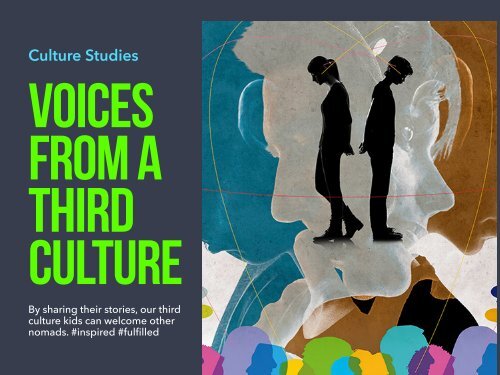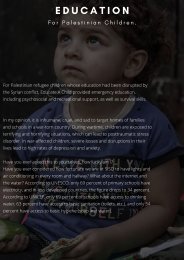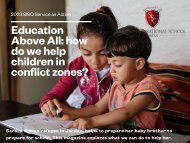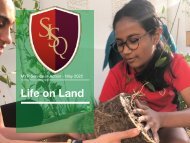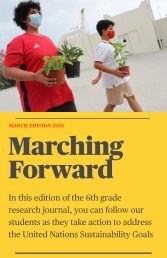Voices from a third culture
This is the first draft of a magazine created by the Culture Studies students to highlight the unique experiences of third culture kids.
This is the first draft of a magazine created by the Culture Studies students to highlight the unique experiences of third culture kids.
Create successful ePaper yourself
Turn your PDF publications into a flip-book with our unique Google optimized e-Paper software.
Culture Studies<br />
VOICES<br />
FROM A<br />
THIRD<br />
CULTURE<br />
By sharing their stories, our <strong>third</strong><br />
<strong>culture</strong> kids can welcome other<br />
nomads. #inspired #fulfilled
Where are<br />
you <strong>from</strong>?<br />
• For most people, this is the easiest<br />
question in the world to answer. They will<br />
respond without hesitation and tell you,<br />
not only their birthplace, but the exact<br />
suburb or geographical area.<br />
But for <strong>third</strong> <strong>culture</strong> kids (and adults) this<br />
question is a minefield.<br />
What happens if you are “<strong>from</strong>” a country<br />
where you have never lived? Or maybe you<br />
are “<strong>from</strong>” two countries but where not born<br />
in any of them?<br />
And what happens if your mother tongue<br />
is…well…neither your mother’s or your<br />
father’s tongue?<br />
If you are part of the Swiss International<br />
School family then you are probably a <strong>third</strong><br />
<strong>culture</strong> kid so we hope that you will enjoy<br />
reading more about this special community.<br />
Yohan’s Story<br />
When your father is <strong>from</strong> Germany, your mother is an Indian, and you were born<br />
and raised in Qatar, your cultural identity becomes a matter of great concern. It is<br />
a concern in school, a concern in public life and a concern at home. Many<br />
questions arise. Am I culturally free and open-minded, or am I just culturally<br />
rootless? Third <strong>culture</strong> kids like me learn a lot as we get along in a <strong>culture</strong> where<br />
neither of our parents belong. Where exactly are you <strong>from</strong>? This is a question<br />
that I find myself trying to answer, wondering whether the answer should dwell<br />
on my nationality, where my parents were born, where I live now, or a<br />
combination of all these different backgrounds.<br />
How overwhelming can life as a <strong>third</strong> <strong>culture</strong> kid be?<br />
What is a <strong>third</strong> <strong>culture</strong> kid?<br />
Third Culture Kids (TCK) is a term coined by Dr.Ruth Hill Useem (1915-2003) that<br />
refers to children and individuals who have spent significant parts of their early<br />
development and formative years of life in a <strong>culture</strong> different <strong>from</strong> that of their<br />
parents. These children build relationships and broadly identify with all the<br />
<strong>culture</strong>s in play but do not have full ownership in any of the <strong>culture</strong>s. The kids'<br />
life experiences assimilate aspects of each <strong>culture</strong>. But, these kids derive the<br />
sense of belonging <strong>from</strong> the relationships they create with others of the same<br />
background or sharing similar experiences (Pollock, D.C., & Van Reken, R. E.,<br />
2001). These children usually make their own version of <strong>culture</strong>, different <strong>from</strong><br />
the existing one due to influences of the parental <strong>culture</strong> and the <strong>culture</strong> they are<br />
living. It is called <strong>third</strong> <strong>culture</strong> (Faye, N., 2016). It is a new <strong>culture</strong> that results in<br />
the mixing and merging of parental <strong>culture</strong> and birth <strong>culture</strong>.
Do I fit the bill as a Third Culture Kid- ? Yes, I am rightly<br />
and perfectly a Third Culture Kid because my mother is an<br />
Indian, my father is German, and I was born and raised in<br />
Qatar.<br />
The Dilemma of Cultural Origin<br />
Where exactly am I <strong>from</strong>? Depending on the person<br />
asking and the context, I usually have different answers.<br />
My answers and story keep changing, just like with all<br />
other Third Culture Kids. I often go for the short and<br />
straightforward option: Germany and India. Other times I<br />
go with a long explanation of my mixed German and<br />
Indian cultural origins and affirm to the person asking that<br />
I feel like my real home, the only home I have known in all<br />
my life, is Qatar. The next question is always harder. Are<br />
you a Qatari? Due to the fact I am a Third Culture Kid, I am<br />
more comfortable omitting details of my origins. Instead I<br />
provide information to such a level that others will find it<br />
easier to digest and understand my roots. All over the<br />
world, Third Culture Kids are living with cultural dilemmas.<br />
Benefits of Living as a Third Culture<br />
Kids
Life as a Third Culture Kid can be liberating and overwhelming at the same time. Living with no strong cultural identity to and<br />
attachment with both the parental <strong>culture</strong> and the <strong>culture</strong> of birth is liberating to say the least. Like all Third Culture Kids, I consider<br />
myself to have strong capabilities of crossing <strong>culture</strong>s with ease and be more culturally adaptive, highly open-minded, better in<br />
communications, more culturally empathetic and, most importantly, bilingual (Useem, H 1999)<br />
Unlike non- Third Culture Kids, I am perfectly aware that there is more than just one way of looking at cultural situations. Living with<br />
parents who belong to two different cultural backgrounds and being born in a different <strong>culture</strong> means I have at least three ways of<br />
understanding wrong answers. Because I feel like a cultural outsider in all the cultural experiences surrounding me, I am well<br />
capable of appreciating different points of view. For example, when growing up among other kids in school, I was regarded<br />
different <strong>from</strong> the other kids because of the way my mother dressed me, the type of bread that she chose for my lunch and many<br />
other things as these were not the norm in my <strong>culture</strong> of birth. My social group in school was also cultural outsiders. In this way, I<br />
was able to understand the strength of cultural differences and similarities at an early stage of my life<br />
I objectively consider myself more emotionally intelligent than my non-Third Culture Kid friends. I can control my emotions, I can<br />
notice, register and understand social norms more proficiently than my other peers. What about cultural adaptability and making<br />
relationships? Compared to other peers, I am more culturally adaptive as far as organizational, ethnic and national <strong>culture</strong>s are<br />
concerned. Furthermore, I am well aware of more than one world view in <strong>culture</strong> and form relationships easily because I am<br />
linguistically and culturally open-minded.<br />
There are multiple positive elements of being a Third Culture Kid, but there are some downsides that only Third Culture Kids<br />
experience. I am not an exception. For example, I often struggle with personal and cultural identity and loyalty. I am not sure<br />
whether I should define myself more as a Qatari, German or Indian. At the end of the day, I will have to assume one, two or three<br />
identities depending on the situation. When meeting relatives <strong>from</strong> my mother’s Indian side, I struggle with being an Indian and<br />
when I am with my father’s relatives, I assume a German identity. A dilemma occurs as a result, and I frequently end up in these<br />
gatherings bringing none of the three- an empty vessel. On the side of food choices, my eating habits are greatly shaped by my<br />
mother’s cultural backgrounds. However, I find it easy to appreciate different dishes <strong>from</strong> different <strong>culture</strong>s.
Multicultural and Multilingual<br />
Environments<br />
As a Third Culture Kid born and raised in Qatar, I am<br />
linguistically competent. From speaking English and basic<br />
Arabic, to understanding Hindi and German, I fit well in<br />
every linguistic environment. I switch languages with much<br />
more ease than other non-Third Culture Kids in my social<br />
groups.<br />
"Inshallah"- is a term I use a lot which means "God willing"<br />
or "only by God's grace" will anything happen. For example,<br />
"I will see you tomorrow, inshallah," implies that only God<br />
knows if the speaker will be alive another day. As a built-in<br />
excuse, "inshallah" is commonly employed by someone<br />
who has no intention of performing what you're asking<br />
them to do, then claims that it is out of their hands and up to<br />
a higher force! As-salamu alaikum, or "Peace be with you," is<br />
a frequent Muslim greeting. Regardless of their native<br />
tongue, Muslims greet each other with this expression<br />
worldwide.<br />
Islam is the most popular religion in Qatar practiced by<br />
67.7% of the population. Hinduism and Christianity are each<br />
practiced by 13.8% of the population. I understand that<br />
Islam is as important as Hinduism and Christianity. I would<br />
not have the same religious relativism if I were a non-Third
Cultural traditions in Qatar are highly influenced by the<br />
country’s historical backgrounds of Bedouin descendants<br />
that trace their origins in the Middle Eastern deserts. The<br />
traditions are also influenced by Islamic <strong>culture</strong> that tends<br />
to be conservative. Having said that, my German heritage<br />
is comparatively less conservative. I am perfect in<br />
appreciating and living in <strong>culture</strong>s with desert nomadism,<br />
flashy cars, camel transportation, Bedouin carpets and<br />
tents and national symbols present in Qatar and those<br />
considered foreign in either India or Germany. <br />
Despite many efforts to root out gender imbalances in<br />
Qatar, gender-based segregations in public places still<br />
exist in the country to women’s disadvantage. This is<br />
highly unheard of in places such as Germany. Owing to<br />
the fact that I understand both <strong>culture</strong>s, it is possible for<br />
men and women to live in and try to eradicate these<br />
cultural biases without causing cultural stress in Qatar.<br />
And we have a lot to learn <strong>from</strong> Qatar too.<br />
These are some benefits of living as a Third Culture Kid in<br />
Qatar. Therefore my message as a <strong>third</strong> <strong>culture</strong> kid is as<br />
follows: Be appreciative of all <strong>culture</strong>s and strive to<br />
understand them <strong>from</strong> an insider’s point of view.
Cedric’s Story<br />
The world as we know it is enveloped with phenomenal and<br />
unique <strong>culture</strong>s that create diversity amongst us humans,<br />
Qatar is known to be a hive of people <strong>from</strong> every corner of<br />
the globe bringing us together. As a result of this many of us<br />
come <strong>from</strong> a background known as being a “<strong>third</strong> <strong>culture</strong><br />
kid”, but what exactly does <strong>third</strong> <strong>culture</strong> mean? It is a group<br />
of children who spend their development years overseas,<br />
shaped by the multicultural norms of the places they've<br />
lived, and the peripatetic spheres of their parents, who<br />
usually have labour requirements that causes them to move<br />
a lot. Consequently, this may seem like traveling and going<br />
through outstanding amounts of experiences is great but<br />
you have to take into consideration many other factors<br />
(Editors of Merriam-Webster<br />
I am Filipino, my mother is <strong>from</strong> the Philippines and my<br />
father is <strong>from</strong> France. I was born in Nice, France but have<br />
spent most of my life abroad in over 5 countries.
Firstly let me introduce myself: I am Filipino, my mother is<br />
<strong>from</strong> the Philippines and my father is <strong>from</strong> France. I was<br />
born in Nice, France but have spent most of my life abroad<br />
in over 5 countries. Due to these conditions, I was exposed<br />
to a variety of <strong>culture</strong>s <strong>from</strong> different parts of the world<br />
encountering many forms of customs and traditions. I'm<br />
very grateful for such opportunities to have met people<br />
with different beliefs allowing my knowledge to expand<br />
and being more open-minded about certain topics.<br />
On the other hand, it may be very difficult at first during<br />
the transition period as many <strong>third</strong> kid <strong>culture</strong>s may feel<br />
neglected or left out as they are introduced to a new life.<br />
From my experiences I can indeed agree that this<br />
statement is correct, throughout my life there have been<br />
moments where I was consumed by the thought of not<br />
being able to fit into such a new environment.<br />
Consequently, this issue will usually tend to dissolve as you<br />
will find people who have many similarities compared to<br />
you, allowing you to find a temporary home.<br />
The word temporary has a<br />
very profound meaning to<br />
<strong>third</strong> <strong>culture</strong> kids. <br />
It seems that a very common issue that is developing<br />
amongst us is a difficulty to create relations and get<br />
attached to our new life. <br />
With my research collected, this is very much due to the<br />
fact that we believe having such commitment with people<br />
will cause mental stress moving to new places. This may<br />
seem like a reasonable idea but in my opinion, I think<br />
you should not discard social interactions with others to<br />
save yourself <strong>from</strong> getting hurt but embrace the<br />
moments created in order to progress as a person. <br />
Another aspect that I<br />
struggled with was having<br />
trouble finding my “identity”.<br />
Third-<strong>culture</strong><br />
kids fear of being questioned about where they're <strong>from</strong><br />
derives <strong>from</strong> their experience growing up between<br />
<strong>culture</strong>s. While they feel strongly attached to their host<br />
nations, they do not feel totally at home in any one <strong>culture</strong><br />
as they may not have witnessed long enough of a certain<br />
<strong>culture</strong> to label themselves.
Attending a local or international school is a decision that<br />
has a significant impact on a kid's sense of belonging;<br />
programs like the IB Curriculum may make a child more<br />
adaptable, but a local education provides more<br />
opportunities for immersion.<br />
According to a Denizen poll, the average <strong>third</strong>-<strong>culture</strong> child<br />
has relocated at least once before the age of five and will<br />
move at least four times during their lives. 85 percent can<br />
communicate in at least two languages, and 47 percent can<br />
communicate in at least three. I have fallen into this<br />
category as moving a lot has forced me to adapt to learning<br />
English ,making it my most fluent language, but I have kept<br />
my origins meaning I can speak French, English, German<br />
and Tagalog. <br />
This introduces the academic side of <strong>third</strong> <strong>culture</strong> kids.<br />
“In 2001, it was found by the U.S. Bureau of Labor Statistics<br />
that 61.7 percent of 2001 high school graduates were<br />
enrolled in college. That same year, it was found that 95<br />
percent of the TCK population were either enrolled or had<br />
some college education.” (Wikipedia Contributors)
As a community, it is very important to be self-aware and<br />
know more about your surroundings as more than 220<br />
million people are <strong>third</strong> <strong>culture</strong> kids!<br />
How can you be considerate about their struggles, teach<br />
your youngster to listen to their "internal voice" as well as<br />
the one that dominates. Dr Carr-Gregg argues that being<br />
proactive and "reframing things in a positive way" might<br />
help to change this negativity. Reframing can help us<br />
overcome negative beliefs and feel more in control and<br />
happy. For instance, if the child believes, "Again, a new<br />
school, I won't be accepted or make any new friends,"<br />
educate them to reframe the thinking as "a new school, a<br />
new beginning filled with intriguing individuals who will<br />
turn out to be excellent friends.". Another element in<br />
addition to this is to guide them in order to find a hobby<br />
that they are passionate about in order for the transition<br />
between <strong>culture</strong>s to be smoother and allow them to feel<br />
accepted.<br />
In conclusion, “the constant move and<br />
amendment of friends can disrupt their<br />
social lives and can result in withdrawal,<br />
isolation, or anger. While some <strong>third</strong><br />
<strong>culture</strong> kids reflect on their experiences
SISQ students<br />
are inspired to<br />
support<br />
others…<br />
• In our “creating <strong>culture</strong>”<br />
units, students identified<br />
how challenging it can be to<br />
go to a new school in a new<br />
country and they decided to<br />
write some messages to<br />
support any new students<br />
who might be feeling<br />
overwhelmed…
Where is your home?<br />
Dear Third Culture Kid,<br />
Which <strong>culture</strong> do you belong to? Hard question, right?<br />
Especially when you have parents <strong>from</strong> different <strong>culture</strong>s,<br />
and you happen to be born in another country. Well, in case<br />
you didn’t know, you are under the category of “Third<br />
Culture Kids.” Nice to know that you aren’t the only one in<br />
this world who happens to live away <strong>from</strong> your home<br />
country. Third <strong>culture</strong> kids are children who spend a long<br />
period of time in many different countries which aren't their<br />
own. Think about it for a second - there could be a lot of<br />
advantages! But, we all know that when you have an<br />
advantage, you always have a disadvantage.<br />
In this letter, you will learn all about you being a <strong>third</strong> <strong>culture</strong><br />
kid – the ups and the downs and everything in between. I am<br />
also one of you and this is my experience brought into your<br />
hands.
Advantages of being a TCK!<br />
It is befitting that I enlighten you about my <strong>third</strong> <strong>culture</strong><br />
background. My dad is German, while my mother is Indian,<br />
and I was born and raised in Qatar. Going deeper into my<br />
lineage, my great grandmother is Burmese, and my<br />
grandmother is Turkish. Therefore, my <strong>third</strong> <strong>culture</strong>, just like<br />
those of other <strong>third</strong>-<strong>culture</strong> kids, is influenced by both my<br />
parents’ <strong>culture</strong> and the <strong>culture</strong> of where I grew up.Third<br />
<strong>culture</strong> kids have the advantage of being immersed in<br />
multiple <strong>culture</strong>s, which, <strong>from</strong> my experience, provides<br />
excellent cross-cultural skills.Many TCKs are multilingual,<br />
which means you can speak multiple languages. Speaking<br />
multiple languages helps communicate to other people,<br />
not only your kind. This will help build friendships as you<br />
can see other people’s perspectives.Another clear<br />
advantage is your ability to adjust to new situations quickly.<br />
Because you move around so much, you can adapt to<br />
change more than people who only move once in a<br />
lifetime. You are so used to everything changing, that<br />
sometimes you don’t even feel it as you don’t mind.<br />
Adapting to situations also means that you will not spend<br />
time thinking about your circumstances but be satisfied<br />
with your new life. You will also find it easy to get back up<br />
when life knocks you down as it will be easy to find new<br />
ways. <br />
You are a resilient, <strong>third</strong><br />
<strong>culture</strong> kid.<br />
You also feel empathy towards others especially someone<br />
new in the society because you know how it felt when you<br />
were an outsider. You have been there, the new person in<br />
this new world, so you know how it feels to be in a different<br />
place, which makes it easier for you to show empathy to<br />
others.<br />
Diversity does not threaten<br />
you. Have you ever seen<br />
someone wearing a hijab?<br />
Did you stop them and laugh<br />
at them? No, because you<br />
are a <strong>third</strong> <strong>culture</strong> kid. TCKs<br />
do not stare....
Now for the disadvantages...<br />
You are a foreigner to your own <strong>culture</strong>. This happens a lot<br />
to a TCK as when we go back “home.”, we do not fit in our<br />
original <strong>culture</strong>. From my experience, when I go back to my<br />
mother’s homeland, I cannot speak their native language<br />
making it difficult for me to communicate with my family<br />
members. This can lead to misunderstandings and fall outs<br />
as we cannot understand each other. When I go over to my<br />
father’s homeland, I find it uncomfortable how my family<br />
members ‘freely talk’ as I do not swear. My extended family<br />
may eat food that isn’t halal even though I have adapted<br />
the Arab <strong>culture</strong> of Halal food.<br />
mean I am a lost soul. We TCKs have each other. I hope this<br />
helps keep your spirits high, that you do not stand alone.<br />
TCKs are everywhere, and you are lucky enough to have a<br />
passport stamped a lot of times as some people cannot<br />
afford a passport and never see or experience in their<br />
lifetime what you have before the age of 18 . This is the life<br />
someone else would just want a day of and it is all yours. I<br />
hope this letter will get you comfortable on being a TCK as<br />
it will have a major impact on you in a beneficial way. Trust<br />
me!<br />
Yours sincerely<br />
Lydia<br />
No pets allowed. Because of the constant moving and<br />
shifting, having a pet will add on to the family burden. Pets<br />
are very hard to shift <strong>from</strong> countries as it is expensive and<br />
may take a lot of time. So, scrap that out of your bucket list<br />
as it is not going to happen till you move out. But at least<br />
you don’t have to sift kitty litter or clean up after the dog !<br />
Well, this wraps up your life story. Remember, you are not<br />
the only one going through bereavement, I am one of you.<br />
From my experience as a TCK, I never had the chance to<br />
feel the <strong>culture</strong> of my home countries, but that does not
A message <strong>from</strong><br />
arianna<br />
I always try to be a glass half full kind of girl and <strong>from</strong> my<br />
own personal experience I do know that being a <strong>third</strong><br />
<strong>culture</strong> kid can actually be a really good thing. It’s like we<br />
understand each other in a way. My mother is <strong>from</strong><br />
Scotland, while my father is Italian but was raised in<br />
England. They have both lived in Qatar for almost sixteen<br />
years. I was born in Qatar and therefore as a <strong>third</strong> <strong>culture</strong><br />
kid I live a life, which has been influenced by a blend of<br />
Scottish, English, Italian and Qatari <strong>culture</strong>s. Some people<br />
say it’s truly unique to be a <strong>third</strong> <strong>culture</strong> kid however,<br />
sometimes you don’t know when to call a place home.<br />
Born in Qatar, I have lived here all my life. I attended the<br />
same primary school <strong>from</strong> the age of three until aged<br />
eleven and I know that this has provided me with great<br />
stability. Since the age of two months, I have travelled and<br />
been exposed to many different countries and <strong>culture</strong>s. My<br />
parents wanted me to experience this as it gives me an<br />
opportunity. Since I can remember, experiencing life in a<br />
multi-cultural and diverse society has been completely<br />
normal to me. As an individual, this makes me confident<br />
because I feel open-minded, tolerant, adaptable and<br />
accepting of people <strong>from</strong> every pocket of the globe.<br />
Having an understanding of mixing <strong>culture</strong>s is truly<br />
remarkable. Communicating with people who are <strong>from</strong><br />
different <strong>culture</strong>s, races, religions and those who speak<br />
different languages is something that is natural and does<br />
not faze me. I am a very well rounded person and the fact<br />
that I have multiple <strong>culture</strong>s shaping my mind, personality<br />
and spirituality makes me feel special and unique and I<br />
love this about myself! However, being a <strong>third</strong> <strong>culture</strong> kid<br />
based in the same country since birth, attending only one<br />
school, having the same best friend since I was three and<br />
having pets makes it much easier for me to be positive<br />
about being raised as a <strong>third</strong> <strong>culture</strong> kid. I know other kids<br />
are not so fortunate and it must be seriously tough on<br />
them.<br />
As in life, there are always some challenges. Even for<br />
myself, and more so for <strong>third</strong> <strong>culture</strong> kids who have had no<br />
choice but to bounce <strong>from</strong> country to country and <strong>culture</strong><br />
to <strong>culture</strong>, there can be a downside. For me personally, I do<br />
not get to see my extended family in the United Kingdom<br />
as often as I would like. Although every summer I spend
two months in the United Kingdom, there is a sense of disconnect<br />
because one whole year passes before I see family again. A lot happens<br />
and changes in one year. This sometimes makes me feel that I have<br />
missed out on so much, and I don’t like that feeling. Additionally, people<br />
come and go in the life of a <strong>third</strong> <strong>culture</strong> kid. Sometimes it can feel like<br />
friends are family and then overnight situations change and those<br />
people are catapulted out of your life. This can be terribly upsetting and<br />
disruptive in feeling stable and settled. The idea of making new friends<br />
and connections, unable to have pets and studying in unfamiliar<br />
languages must often feel exhausting and sometimes even terrifying.<br />
Sometimes they might even give up on the idea of finding best friends<br />
because they can’t face the pain of getting up and leaving again. They<br />
may struggle in understanding their own sense of identity and where<br />
they actually belong.<br />
In closing, I would like to welcome you again to our SISQ community. I<br />
know as a <strong>third</strong> <strong>culture</strong> kid you might be feeling all sorts of crazy feelings<br />
right now, but let me just reassure you, you are not alone. There are<br />
many of us here, and we are thriving in the SISQ community at this time.<br />
You are going to feel a great sense of belonging because those around<br />
you empathize with your status and want to make you feel at home, for<br />
however long that may last. <br />
It is a journey to look forward to.


